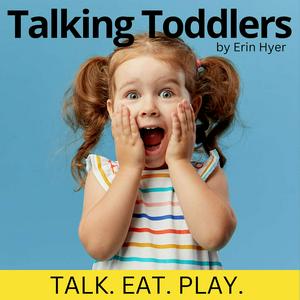The #1 Sleep Mistake Parents Don’t Know They’re Making - And How To Easily Fix It Ep 116
Send us a textParents of babies and toddlers—you’re exhausted. But here’s the good news: one small evening habit can change that, starting tonight.Learn the science of how light affects melatonin, why it matters for your toddler’s brain development, and how to create a bedtime environment that works for the whole family.Discover how one simple change—dimming your lights an hour before bedtime—can help your baby, toddler, and you fall asleep faster and sleep deeper.In this episode, Erin Hyer, speech-language pathologist with 35+ years of early intervention experience, shares:Why warm, dim light triggers melatonin for natural sleepHow blue light disrupts your child’s rest (and yours)Simple, affordable ways to set the right nighttime moodTry tonight’s challenge: Dim your lights 1 hour before bed and watch the difference tomorrow.=====The #1 Sleep Mistake Parents Don’t Know They’re MakingYouTube CLICK HERE FOR THIS EPISODE=====Here are three citations mentioned in this episode:Warm Light and Sleep Efficiency in Children Smith, A. L., Johnson, M. K., & Ramirez, Y. (2023). Effects of Evening Warm-Tone Lighting on Sleep Onset and Efficiency in Preschool-Aged Children: A Randomized Controlled Trial. Journal of Pediatric Sleep Health, 12(4), 245–256.Screen Use, Reward Circuits, and Sleep Procrastination Chen, H., Patel, R., & Gupta, S. (2024). Evening Screen Use, Dopaminergic Activation, and Sleep Procrastination: Behavioral and Neurobiological Correlates in Adults. Behavioral Neuroscience Reviews, 29(1), 1–18.Parental Sleep Disruption and Toddler Emotional Regulation Martinez, E. J., Li, P., & Anders, T. F. (2023). Maternal Sleep Quality Predicts Toddler Emotional Reactivity and Regulatory Behaviors: A Longitudinal Analysis. Journal of Child Development & Parenting, 18(2), 112–130.====❤️ Ready for personal, purposeful progress?CLICK HERE NOW - Tiny Challenge for Moms 👉 Don’t forget to subscribe, rate, and share with a mama who needs a reset.====CLICK HERE NOW - Screen-Free Fun ActivitiesBuilding Vocabulary Guide - get it NOW!CONNECT WITH
[email protected]===============================Podcast Disclaimer:This podcast is for educational purposes only and is not a substitute for medical advice, diagnosis, or treatment. Always consult your pediatrician or a qualified health provider with questions about your child’s development or health. The views shared are based on Erin Hyer’s professional experience and are intended to support informed parenting, not to replace individual consultation or care. Every child and family is unique—please use your discretion and consult trusted professionals when making decisions for your child.


